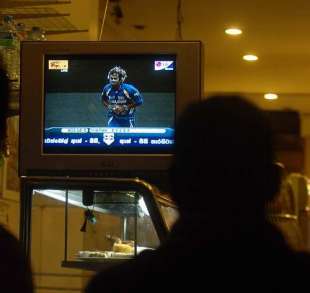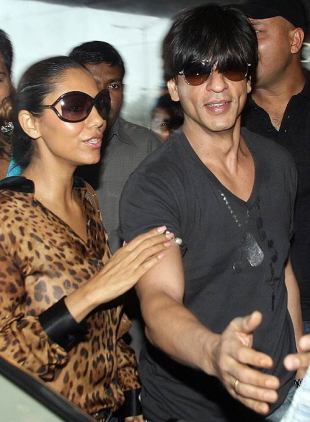|
|
|

TV-rights money is the core element of the IPL's finances, but the economic downturn has not been good news for the rights holders
© AFP
|
|
| |
The deepening global recession seems to have finally caught up with the IPL. With
just six weeks to go for the league's second season, franchises are scrambling to
sign up sponsors and question marks have been raised - though IPL
commissioner Lalit Modi emphatically denied them on Friday - within the industry about some of the league's long-term sponsorship deals.
Consider this: Rajasthan Royals, the IPL champions, are yet to finalise a team
sponsor this year after their deal with insurance firm Bajaj Allianz broke down;
HDIL, a housing company, has pulled out of an agreement with Kolkata Knight Riders;
and Deccan Chargers, who finished bottom of the table last season, have lost their team sponsor, the Jaypee group.
A basic costs-and-expenses sheet for the last IPL season by an independent industry
analyst estimated most franchises were hit by a shortfall of around Rs 20 crore (US$4
million) or more. "We have not yet reached the potential we thought was there," an
official from a leading franchise told Cricinfo when asked about the coming season.
"The purse strings are definitely tight. If the market situation was at least 20% better than last time, things would have been different. Now, though, the sponsors are sticking to their guns on pricing and are holding out till the very end. In normal circumstances most of the deals for the second season would have been struck by now. But we are still talking. We hope things will look up once the IPL nears and the hype starts."
Recent developments have suggested that the league itself is not immune to market
turbulence. IPL officials say they are safe as long-term contracts are in place with
sponsors. Besides, the league gets 20% of the media rights - sold for 10 years to the
Sony-WSG combine for $ 1.02 billion - on an annual basis and 40% from the central
sponsorship pool. That, though, is where the problem could lie. Some of the bad news is fact, some buzz in the marketplace, but none of it inspires confidence.
BIG TV, a DTH provider, has pulled the plug on a sponsorship deal worth $ 31.1 million. A deal with Pepsi, originally the league's "pouring partner", worth around
$2.5 million annually has been "decentralised", leaving Pepsi free to tie up with
individual teams. Pepsi bought the on-ground rights to the IPL, after which
Coca-Cola, its traditional rival, signed an on-air deal directly with Sony that gave
them exclusive visibility on TV. Apparently Sony itself is struggling with sponsors - Kunal Dasgupta, its
former chief executive, is on record as saying not too many are coming
forward for the IPL. "We have tapped many but they are just not interested since
they do not have the monies," Dasgupta said this week on the sidelines of a business
conference; days later, he quit the job, citing personal reasons.Sony is reportedly charging Rs 3.5-4 lakh ($7-8000) for a 10-second ad spot - a 100% premium on last year's rate - but is still caught in a no-win situation. The rates are believed to be too high in the current scenario, and even if they are met, it may not be
sufficient to cover all expenses.
Reports also suggest the IPL's five-year, Rs 200 crore ($40 million) title
deal with DLF, India's leading real estate major, has been restructured and diluted,
but this has been denied by both sides. "I cannot say what will happen tomorrow,"
Sanjoy Roy, DLF's senior general manager (corporate communications) said. "The other
sponsors may have pulled out, but as far as DLF is concerned, as of now the deal
stands as it is."League v franchises
"The aborted Big TV DTH deal would have contributed to the IPL's central sponsorship
pool from which the franchises get a percentage," a franchise official said. The
eight franchises get to divide among themselves, on an annual basis, 72% from the
sale of IPL's media rights and 54% from the league's central sponsorship pool.
Franchise officials say that they have borne the brunt of the recession as the IPL
is not out in the market talking to sponsors the way they are. "The BCCI [which runs the
IPL] is aware of the problems we are facing; it should come forward and help us out
of trouble," Ness Wadia, a co-owner of the Kings XI Punjab team, was quoted as
saying last month. "The board must understand that these are difficult times and we
need to work out ways to see that all franchisees survive. If we don't do well, the
BCCI too wouldn't benefit. There are many financial and cricketing issues that need
to be addressed."
| |
|
|
|
| |
| Ironically, franchise officials now say that the main factor that can help them tide over the current market dip is the one that was overshadowed by all the glitz and glamour last time: the cricket |
| |
|
|
|
|
But the IPL's role is to act as a facilitator, says Sundar Raman, the league's CEO.
"We have created more opportunities for the franchises to maximise their
monetisation," Raman said. Among those opportunities is the provision for more in-stadia visibility for the franchises this year; franchises will also get to sell an entire stand each, naming it after a sponsor.
Franchise officials say it is time the IPL enlarged their share of revenue, though
similar demands made earlier have already been rejected by the league. "Given the
circumstances, teams will be looking forward to favourable payment terms from the
IPL, but we need to reasonable," Joy Bhattacharya, team director of the Kolkata Knight Riders, said.
The IPL management is clear that the league's business model was made keeping in
mind franchises not getting money in the first year. Their line is simple: if a
franchise's business model is strong, there is no reason for worry.
Some weather it better
The franchises generally reckoned to have the stronger business models seem to have
done better. The Rajasthan Royals franchise, bought by Emerging Media for $ 67
million, is now worth $ 140 million (based on the sale of a 12% stake for $15.4
million last month). Kolkata Knight Riders, co-owned by Shah Rukh Khan, is said to have taken the smallest hit after the first season, and last week signed a three-year
associate sponsorship deal with Coca-Cola for a reported Rs 5 crore (around $ 1
million) every year.
"Compared to last year, the sponsorship opportunities are much tighter this year,"
Bhattacharya said. "Sponsorship is all over the place; some are closed, some are not, some are waiting to close. It is not an overvalued league. There is a cash-flow crunch, not an endemic problem."
He admitted, though, that the operational cost of running a franchise has increased
and is now between Rs 80-120 crores ($ 16-24 million). "The extra expenditure that
teams have picked up this time is that of running offices for one year," he
said. "Last year everything was set up for about three months.
|
|
|

Shah Rukh Khan's franchise is one of the few that has managed to keep its head above water to some extent
© AFP
|
|
| |
"Then comes the cost of foreign players: the dollar was at Rs 40 when you bought them last year, and that has increased. Also, there is a 20% rise in foreign players. In addition, some teams have spent an extra $2 million at the auction. Add that to the cost of
running various camps here and abroad."
Kolkata has banked entirely on the brand charisma of Shah Rukh to boost their
balance. "Shah Rukh was the main reason why their merchandising strategy took off so
well last year," a market analyst said. "Besides, Shah Rukh is also the brand
ambassador for Nokia, which is a major Knight Riders sponsor. This creates room for
adjustments. For instance, Shah Rukh can give time to Nokia and the revenue will go
to Knight Riders."
Delhi Daredevils have added Coca-Cola and the UB Group to their list of sponsors, but
Amrit Mathur, chief operating officer of the team's owners, said the recession
presented a tight situation. "We are impacted by what surrounds us in the industry and economy. But having said that, we have strong and enduring relationships with our sponsors. That has protected us when compared to some other franchises who may have had one-year sponsorship deals and are facing problems in finding new sponsors."
Manoj Badale, who represents Emerging Media, said the recession was a challenge. "In
these times, people tend to be more selective about what they look for," Badale
said. "People will have less money to send. Match-day sponsors will want more for
the same amount as their budgets will be squeezed. But the biggest income for
the franchise comes from the television rights, and it is contracted for the next 10 years."
Ironically, franchise officials now say that the main factor that can help them tide
over the current market dip is the one that was overshadowed by all the glitz and
glamour last time: the cricket. Asked how the recession could be countered,
Badale said: "We have to focus on our cricket. If we do well on the field, the crowds would like to come and then sponsors may think too."
Ajay Shankar is deputy editor of Cricinfo. With inputs from Nagraj Gollapudi in Mumbai

